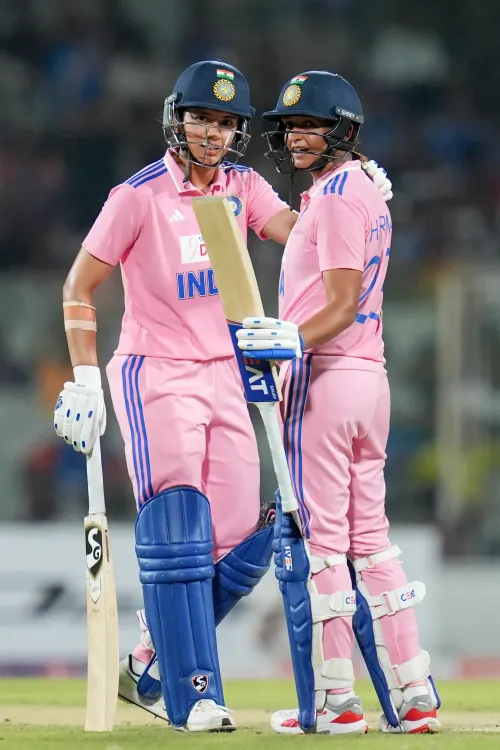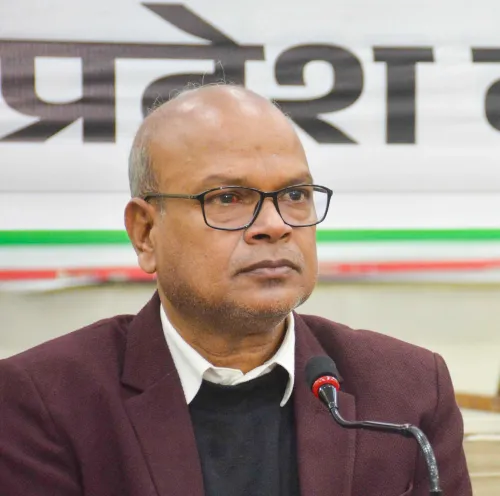What Did Mandhana and Mooney Learn From the ODI Series as the World Cup Approaches?

Synopsis
Key Takeaways
- India needs to improve fielding, having dropped 15 catches in the series.
- Younger players show eagerness to learn and adapt.
- Australia's adaptability to Indian conditions is commendable.
- Tactical flexibility will be essential for both teams in the World Cup.
- Expect tough competition in the upcoming tournament.
New Delhi, Sep 21 (NationPress) As India and Australia concluded a challenging ODI series decider at the Arun Jaitley Stadium, the spotlight now shifts to preparing for the World Cup, which kicks off in less than ten days.
With Australia securing the series 2–1, Smriti Mandhana and Beth Mooney took a moment to reflect on the insights both teams gained from competing in three ODI matches over the span of a week.
Smriti, the vice-captain of India, highlighted the crucial area of fielding that needs significant improvement as they head into the World Cup. India struggled in the field during the series, dropping a staggering 15 catches along with several misfields. This performance was a stark contrast to their strong fielding displays during the recent white-ball series victories in England.
“First and foremost, this series was about identifying the right combinations and understanding our shortcomings, particularly against a formidable opponent like Australia. It was a valuable series for recognizing our strengths and weaknesses. There’s a noticeable gap in fielding between the teams,” Smriti expressed after India's 43-run loss in Saturday’s match.
According to Smriti, who scored an explosive 125 runs off 63 balls in the third ODI, the most encouraging aspect for India was the eagerness of younger players to learn, adapt, and develop. "This series isn’t about instilling false confidence about winning the World Cup; we've always believed in ourselves,” she stated.
“This series provided us with insights on what’s working and what isn’t, especially since Australia is the ideal opposition for testing our capabilities. We've had an excellent past year at home but didn’t face Australia here recently.”
“We’ve garnered numerous positives and identified areas for improvement. As long as we maintain that willingness to put in the effort, victory will follow. I see a lot of determination in the girls—the desire to win, learn, and grow. It's a youthful squad, but the motivation level is exceptionally high,” she added.
With India slated to play across all five venues during the World Cup, Smriti emphasized the importance of tactical adaptability in the tournament. “We’re not keen on disclosing our combinations yet since the World Cup is still 8 to 10 days away. However, I can’t commit to a single lineup; it will largely depend on the pitch and playing conditions.”
“One-day World Cups are lengthy, and you can’t simply declare your eleven and stick to it. We'll remain flexible based on the conditions, and with a fantastic squad of 15, everyone is primed to play. Our final lineup will depend on the circumstances,” she explained.
On the other side, Mooney, who played a pivotal role in Australia’s series victory with a superb 138 in the third ODI, commended her team's adaptability to Indian conditions. “The way we performed throughout the series has been truly impressive from the outset. We haven’t spent much time in India as a group over the last year.”
“Several of us have participated in the WPL, which has helped us pick up crucial insights about the conditions. We constantly learn from each other regarding our playing styles. Phoebe (Litchfield) and I often discuss batting strategies, especially as left-handers, while the other top-order right-handed batters engage in similar discussions.”
“Our goal is to share as much information as possible leading into the World Cup and be ready to adjust as needed. This adaptability will be vital for our group as the tournament progresses,” Mooney affirmed.
With Phoebe (low-grade quad strain), Annabel Sutherland (hip soreness), and Darcie Brown (back spasms) missing the last two matches, their recovery ahead of the World Cup has become a top priority for Australia. “Once they’re fit and ready to return, I believe there’s no limit to what this team can achieve. We can make a significant statement at this World Cup,” she stated.
Mooney also recognized the escalating competitiveness in women’s ODI cricket following Australia’s 2022 World Cup triumph, particularly after a close call in Saturday’s match. “Every game is going to be challenging. There are no easy matches in international cricket anymore, as many teams have dedicated the last three and a half years to this World Cup.”
“From my perspective and that of the entire team, we no longer underestimate any opponent. It’s a tough landscape in international cricket, and we must be at our best when we step onto the field,” she added.
As spin is anticipated to play a significant role in the tournament, Australia has been preparing accordingly, with Beth stating that their strength lies in their versatility. “We entered this series and the World Cup knowing we would encounter various spin types—left-arm, right-arm, leg spin, and off-spin. Thus, we invested considerable time in our pre-season to enhance our approach against these bowlers.”
“Each player has unique strategies, which highlights the strength of our batting lineup; we can all target different areas of the field, and understanding each other's strengths against specific bowlers is crucial for us to open up the game as quickly as possible, just as we did here.”
With the series concluded, both teams are heading to Bengaluru, where they will focus on recovery before branching off for warm-up matches and the World Cup.
“Having not played much 50-over cricket in the past eight months, it’s been a bit of a wake-up call physically, but we have a few days off in Bengaluru,” Mooney concluded.
“Some players are even heading out for a round of golf, although I’ll be skipping that. It’s a great chance to bond, engage in different activities, and take a break from the game before things get intense again.”










